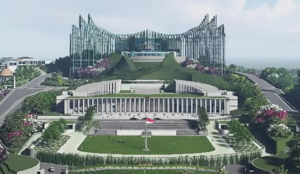JAKARTA — One year after its envisaged inauguration, Indonesia’s future capital Nusantara – officially Ibu Kota Nusantara (IKN) – is drawing tourists and construction workers to its striking presidential palace, but most of the planned city remains quiet. Significant budget slashes, delays in construction, and a shift in government focus have cast doubt over the city’s future.
Political Momentum Fades as Funding Dries Up
- Political support has cooled. Experts say the new administration under President Prabowo Subianto is prioritizing welfare programs over IKN. “The political will on IKN right now feels muted,” said Dedi Dinarto of Global Counsel. Prabowo, having mentioned IKN only once in his inaugural address, has not signed the presidential decree needed to shift the capital from Jakarta.
- Budget cuts have been drastic. Official funds for the project dropped from IDR 43.4 trillion in 2024 to IDR 6.3 trillion for 2026. The IKN authority had requested over IDR 21 trillion.
- Broader austerity measures apply. President Subianto’s 2025 budget efficiency drive slashed government spending nationwide by IDR 306.7 trillion, drastically reducing funds for public works and IKN.
Construction Slows, Vision Stalls
- Minimal development to date. Only 800 hectares of the planned 6,600-hectare government core has been readied for construction.
- Some progress remains . City authority head Basuki Hadimuljono reported that the executive zone—housing the presidential palace and ministries—is roughly 97–98% complete. He anticipates a possible move in 2028 once legislative and judicial structures are ready.
- Airport opening delayed. Though inaugurated in 2024, Nusantara International Airport is not expected to serve commercial flights until 2026.
Financing Challenges Undermine Momentum
- Foreign investment remains elusive. Despite discussions with Middle Eastern and Asian partners, significant foreign capital has yet to materialize.
- Capital’s future uncertain. An anonymous official with the project conceded, “I’m still 50-50 on it (being finished)… a lot of things will not be completed.”
- Expanded investment authority legislated. The 2023 State Capital Act expanded Nusantara’s governing authority, granting autonomy over land, investment licensing, and development—a foundation for future progress.
Vision Holds—But Faces Major Risks
- Long-term strategy remains. The five-phase blueprint aims for 1.2 million residents by 2029 and two million by 2045, underlining ambition if funding and leadership return.
- Local officials remain optimistic. At the ceremonial plaza, tourists take selfies with the iconic Garuda-inspired palace. “IKN is really cool,” said one visitor. Nusantara’s proponents argue halting momentum now would be “your loss.”

Nusantara at a Crossroads
| Issue | Status |
|---|---|
| Political Will | Waning under current administration |
| Funding | Slashed from IDR 43.4T to IDR 6.3T by 2026 |
| Development | Minimal—major infrastructure still incomplete |
| Funding Sources | Foreign investment lagging despite incentives |
| Outlook | 2028 move still possible, but vision remains fragile |
As Nusantara navigates political shifts and tightening budgets, the bold plan to relocate Indonesia’s capital is at risk of becoming a “white elephant.” The next critical years will determine whether the city can rise from an ambitious vision—or stay a symbol of stalled potential. (za)
